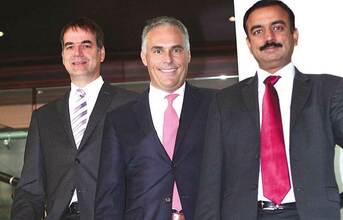
That's why you chose to have this centre in India?
Bharath Sesha: Yes. If you look at the kind of ambitious plans we have in the energy sector, just execution alone will not get us there. It also calls for increasing the efficiency of our existing infrastructure. And there is indeed a huge scope in terms of technology development as Oscar mentioned. We can also use the analogy of landline phones and mobile phones.
India had very low penetration of landline phones but now has more than 900 million mobile phones. So you always have the opportunity with technology, especially in the solar segment, to really leapfrog. And when you have the ambitions like we have in India then it is the right time to encourage technology development.
DSM Engineering Plastics is collaborating with institutes like Automotive Research Association of India (ARAI) and Electrical Research & Development Association (ERDA). Tell us about the same.
Roelof Westerbeek: We select certain applications and then co-engineer and co-develop the use of our materials in those applications with these institutes. We work with them on testing materials, testing solutions, co-designing certain parts. For example, in the electrical industry, there is still a large use of thermostat materials.
And these materials are less green compared to thermoplastic materials. To bring about the shift from thermostat to thermoplastics in the electrical industry for certain applications, you need a lot of testing. We have the polymer knowledge and ERDA has the electrical application know-how.
So we work together to understand what materials can we bring to replace thermostat materials. ERDA has very extensive testing facilities where we together make parts of the electrical equipment, we make prototype tools. And together with ERDA we test them to ensure that our solutions meet all the national standards in India for electrical equipment. With that, we then go to customers to convince them to replace thermostats with thermoplastics.
What are you doing with ARAI?
Roelof Westerbeek: With ARAI we are working for certain parts of the automotive engine. Plastics can substantially reduce the weight of the car making it more fuel efficient. Most of the easily replaceable parts have already been replaced by plastics. But there is still a huge area in the engine components that can be still replaced by plastics. However, those are highly demanding applications with speciality plastics.
So we are working together with ARAI for applications involving complex parts like transmission, turbo systems, certain pumps, certain filters and certain sensors where we specify some of our materials. In the engineering plastics industry, basically every application we sell is very knowledge-intensive. That's why it is very important to team up with speciality institutes because we can combine our knowledge with theirs for the betterment of the industry.
And you also collaborate with customers?
Roelof Westerbeek: Yes, for different parts of the car, you have different collaboration models. If the parts are simpler, the OEMs already have good knowledge about how to design the parts. For a complex part - if they have made a metal part for 30 years - OEMs would also like the know-how. We bring that knowledge to the table in such cases.
So it is important that as a plastics supplier, we do not just supply the plastics, we supply the know-how around the polymer. I always tell my people - ‘we don't sell polymer, we sell a package of know-how, reliability, capabilities and expertise, which is much more than that polymer chip we are selling'.
END



























